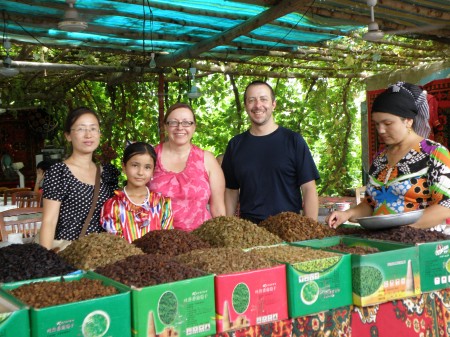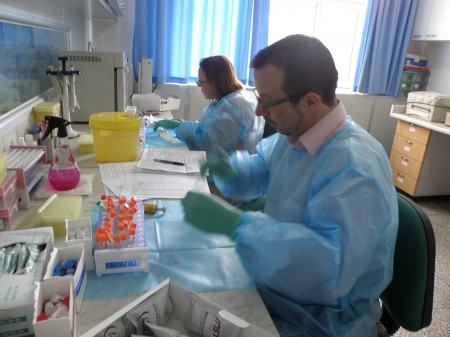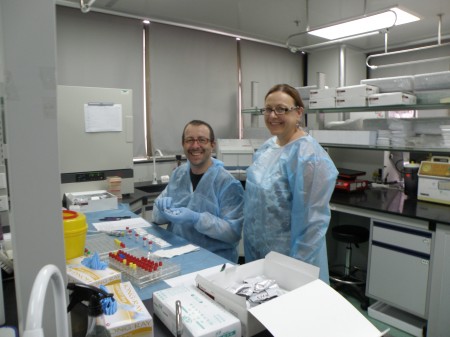The HPTN (HIV Prevention Trials Network) Network Laboratory (NL) supports laboratory aspects of clinical trials performed by the HPTN. The HPTN NL is based at Johns Hopkins University at the School of Medicine in the Pathology Department, and one of its primary focuses is Quality Assessment of many affiliated site laboratories. Our affiliated site labs are located in many countries in Africa (South Africa, Malawi, Botswana, Kenya, Zambia, Zimbabwe, and Uganda), South America (Brazil), and Asia (India, Thailand, and China). As part of our many quality assurance (QA) measures, the HPTN NL verifies HIV infection status of the clinical trial participants who have been enrolled into our prevention trials. We do this by randomly re-testing selected samples using FDA-approved methodologies at the Johns Hopkins Hospital HIV Specialty Laboratory.
Some countries have regulations, however, that prevent the shipment of samples out of the country to the U.S. for testing. China is one of the countries which does not allow samples to be shipped. One of the many ongoing HPTN Clinical Trials, HPTN 058, is being conducted in China and Thailand. HPTN 058 is a Phase III randomized controlled trial that will assess the efficacy of Buprenorphine/Naloxone (BUP/NX) treatment in the prevention of HIV transmission among opiate-dependent injectors by reducing drug use and associated risk behaviors. More information on the study can be found at http://www.hptn.org/research_studies/hptn058.asp.
Recently Paul Richardson, HPTN NL Senior QA/QC coordinator, and I traveled to the two Chinese sites participating in the HPTN 058 study – Urumqi in the Xinjiang province, and Nanning in the Guangxi province – to perform this QA testing on site.
Putting this trip together was a logistical nightmare, and obtaining US FDA-approved testing kits is not easy in many countries due to government restrictions, especially when there is an alternate CE-marked or locally-approved product available. We finally decided that the easiest option would be to purchase the testing kits in the U.S. and donate them to the clinical trial sites. The HPTN NL had recently validated the new FDA-approved one-minute rapid test kit by bioLytical Laboratories, Inc., in Canada, called the INSTI™ HIV-1 Antibody Test Kit, and decided it met our needs perfectly. We had to solicit pre-shipment authorization and approval by the Ministry of Health and local CDC in China. Both were very cooperative throughout this process. Once that was done, we were able to ship the kits. We waited for confirmation that the kits had arrived and were cleared through customs, and then we were ready to plan our trip.
We first met with one of our International QA/QC coordinators, Michelle (Yi) Xing, who is a JHU Pathology employee based in Nanning, China. Michelle is a U.S.-trained Medical Technologist and has been part of the HPTN NL team for over five years. As a native of Shanghai, her fluent communication skills have proven to be essential to the smooth and successful conduct of this clinical trial.
We went to Beijing to meet with Dr. Yiming Shao, the chief expert on AIDS at the Chinese Center for Disease Control and Prevention, Director of the Research on Virology and Immunology, National Center for AIDS/STD Control and Prevention (NCAIDS), and Dr. Liying Ma, Professor in the Department of Immunology and Virology at NCAIDS and China CDC, to discuss the plans for the testing in both Urumqi and Nanning.
After resting up from our flight, we were able to do a bit of sightseeing in Beijing. We went to the Forbidden City, to Tiananmen Square, and were able to climb section of the Great Wall. Oh, and we did stop by the “Bird’s Nest” along with 60,000 other visitors! It was very hot and humid – even hotter than Baltimore in August.
Pictured: Michelle Xing, a young Uyghur girl, Estelle Piwowar-Manning, Paul Richardson, and the Uyghur women selling raisins in the Xinjiang province.
Estelle and Paul working at the Urumqi site.
We then flew to Urumqi, which was a 3.5-hour flight from Beijing. We were able to randomly select, find and re-test 70 samples by the INSTITM HIV-1 Rapid Test and perform the HIV-1 Western Blot (WB) confirmatory testing on any reactive/positive samples.
From Urumqi, we traveled to Nanning, another long flight of four hours, where we performed 117 more HIV rapid tests and additional WB tests on any reactive/positive samples.
At both sites, we asked the local staff to find our randomly selected samples that were stored amongst tens of thousands of other clinical trial samples. It was amazing to see that both sites were able to find each and every one of the specimens we requested at the first attempt and without any errors, another remarkable measure of the high quality of trial conduct from these two overseas sites.
Paul and Estelle at the Nanning site.
After a long and tiring week, we flew back to Baltimore to prepare the data to submit to the HPTN data and statistical center for review. In order to keep the conduct of this QA testing unbiased, Paul and I did not know the expected results of the samples we tested in China. This data will be reviewed by the statistical center and will be reported back to us.
Estelle Piwowar-Manning, MT(ASCP)SI
HPTN Network Laboratory Deputy Director
Johns Hopkins University School of Medicine
Department of Pathology


